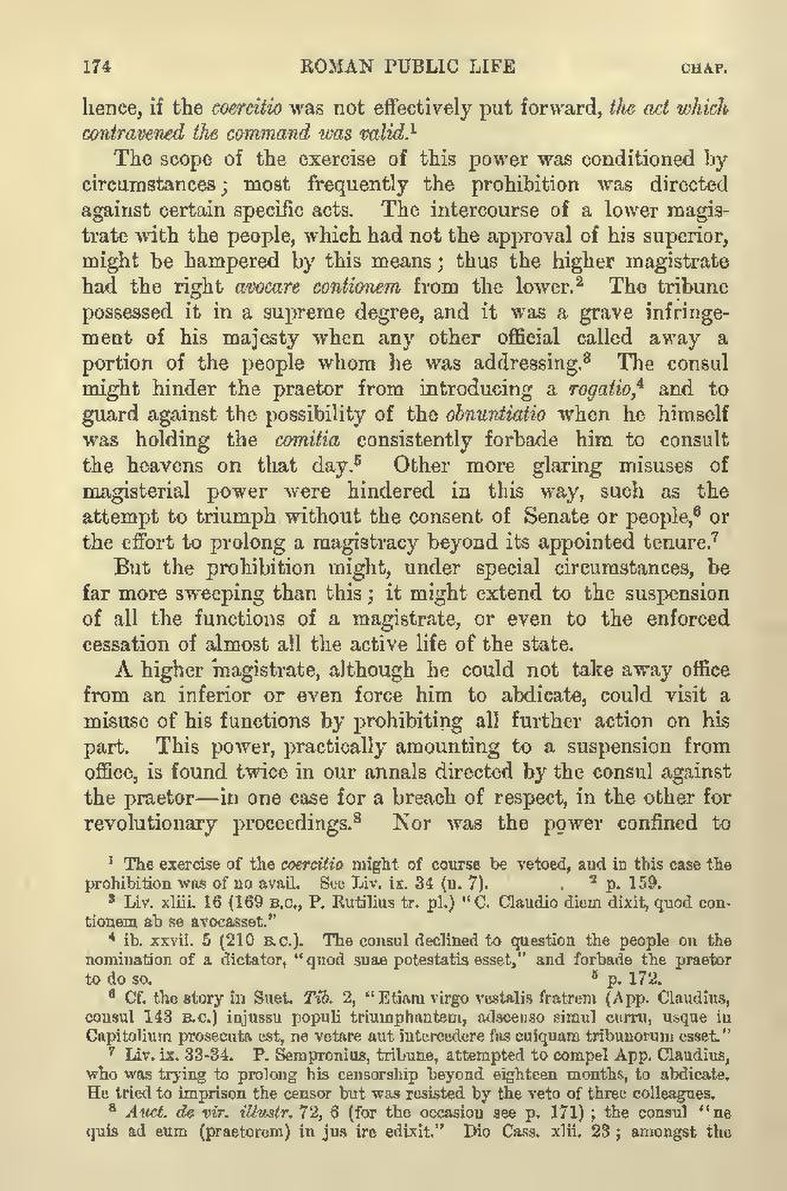hence, if the coercitio was not effectively put forward, the act which contravened the command was valid.[1]
The scope of the exercise of this power was conditioned by circumstances; most frequently the prohibition was directed against certain specific acts. The intercourse of a lower magistrate with the people, which had not the approval of his superior, might be hampered by this means; thus the higher magistrate had the right avocare contionem from the lower.[2] The tribune possessed it in a supreme degree, and it was a grave infringement of his majesty when any other official called away a portion of the people whom he was addressing.[3] The consul might hinder the praetor from introducing a rogatio,[4] and to guard against the possibility of the obnuntiatio when he himself was holding the comitia consistently forbade him to consult the heavens on that day.[5] Other more glaring misuses of magisterial power were hindered in this way, such as the attempt to triumph without the consent of Senate or people,[6] or the effort to prolong a magistracy beyond its appointed tenure.[7]
But the prohibition might, under special circumstances, be far more sweeping than this; it might extend to the suspension of all the functions of a magistrate, or even to the enforced cessation of almost all the active life of the state.
A higher magistrate, although he could not take away office from an inferior or even force him to abdicate, could visit a misuse of his functions by prohibiting all further action on his part. This power, practically amounting to a suspension from office, is found twice in our annals directed by the consul against the praetor—in one case for a breach of respect, in the other for revolutionary proceedings.[8] Nor was the power confined to*
- ↑ The exercise of the coercitio might of course be vetoed, and in this case the prohibition was of no avail. See Liv. ix. 34 (n. 7).
- ↑ p. 159.
- ↑ Liv. xliii. 16 (169 B.C., P. Rutilius tr. pl.) "C. Claudio diem dixit, quod contionem ab se avocasset."
- ↑ ib. xxvii. 5 (210 B.C.). The consul declined to question the people on the nomination of a dictator, "quod suae potestatis esset," and forbade the praetor to do so.
- ↑ p. 172.
- ↑ Cf. the story in Suet. Tib. 2, "Etiam virgo vestalis fratrem (App. Claudius, consul 143 B.C.) injussu populi triumphantem, adscenso simul curru, usque in Capitolium prosecuta est, ne vetare aut intercedere fas cuiquam tribunorum esset."
- ↑ Liv. ix. 33-34. P. Sempronius, tribune, attempted to compel App. Claudius, who was trying to prolong his censorship beyond eighteen months, to abdicate. He tried to imprison the censor but was resisted by the veto of three colleagues.
- ↑ Auct. de vir. illustr. 72, 6 (for the occasion see p. 171); the consul "ne quis ad eum (praetorem) in jus ire edixit." Dio Cass. xlii. 23; amongst the
